In a recent controversy, Simone Biles expressed strong disapproval towards Brittney Griner, suggesting that Griner’s actions have brought shame to those who support American Olympic athletes. The incident in question revolves around Griner kneeling during the national anthem, a gesture meant to protest racial injustice and promote social awareness. However, Biles criticized this action, arguing that such behavior disrespects the values of representing one’s country, especially on an international stage like the Olympics.

Griner’s stance, which mirrors similar protests by other athletes, including Colin Kaepernick, has polarized public opinion. Supporters argue that kneeling is a peaceful and powerful way to bring attention to critical social issues. They see Griner as a courageous advocate for equality and justice, using her platform to voice concerns about systemic racism and discrimination. This support is rooted in the belief that athletes have a responsibility to use their visibility to effect positive change, even if it means challenging societal norms.
Conversely, critics, including Biles, feel that such protests are inappropriate during national events and can be seen as unpatriotic. Biles emphasized that representing the United States comes with the responsibility to uphold and respect the nation’s symbols and traditions. She suggested that Griner’s actions might be divisive and could potentially harm the unity and morale of the Olympic team. The gymnast’s comments reflect a broader debate about the role of athletes in social and political activism, and whether personal beliefs should impact one’s eligibility to represent their country.
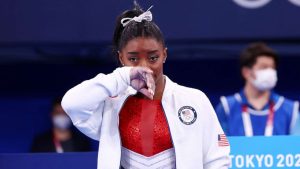
The controversy also touches on Griner’s recent return to the U.S. after being detained in Russia on drug charges, which added a complex layer to her public image. While her release was celebrated by many, her actions and political stances have continued to draw scrutiny. Kid Rock, a musician known for his conservative views, publicly criticized Griner, asserting that those who do not respect America should not have the privilege of representing it. Griner responded by reaffirming her commitment to advocating for justice and equality, highlighting the ongoing challenges faced by activists.
This incident underscores a significant cultural divide in the United States regarding the intersection of sports, patriotism, and activism. It raises essential questions about the extent to which athletes should express their personal convictions, especially when they represent their country on an international platform. The debate also touches on broader issues of free expression, the role of public figures in political discourse, and the boundaries of acceptable protest.
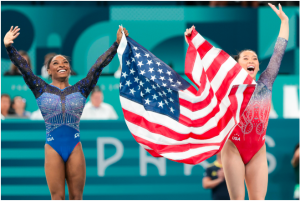
As the Olympics approach, the U.S. Olympic Committee and other governing bodies may face pressure to address these issues. They will need to balance respecting athletes’ rights to free expression with maintaining the integrity and unity of the national team. The outcome of this controversy could have lasting implications for future U.S. delegations and the role of athlete activism in sports.
Simone Biles’ call for Griner to potentially be excluded from the Olympic team sets a noteworthy precedent. It highlights the tensions between personal beliefs and national representation, and the challenges athletes face in navigating their public roles. This situation serves as a reminder of the powerful influence athletes wield in shaping public opinion and driving social change, as well as the complexities involved in balancing individual rights with collective responsibilities.
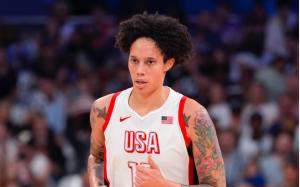
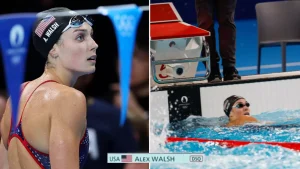
American swimmer Alex Walsh was disqualified and lost out on a bronze medal.
American Olympic swimmer Alex Walsh suffered heartbreak after being disqualified and having her bronze medal taken away in Paris.
Walsh competed in the Women’s 200m Individual Medley Final on Saturday night and looked to have secured a place on the podium.
17-year-old Canadian sensation Summer McIntosh took another gold, with Kate Douglass from the United States coming in second.
Walsh looked to be the second representative from the US in the top three but a video review uncovered that she had committed an illegal turn at the halfway point.
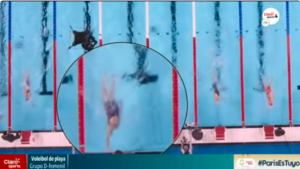
Image: Claro Sports
Walsh was therefore disqualified following the back-to-breast violation and the bronze medal went to Australian Kaylee McKeown, who had initially finished in fourth.
The University of Virginia graduate is known for his versatility when it comes to strokes and won silver in the medley event in Tokyo back in 2021, as well as picking up three golds in the 2023 World Championships.
But it was a very different feeling that she experienced this time around and plenty of fans had sympathy for her following the unfortunate disqualification.
One wrote: “Alex Walsh DQ’ed for a back-breast turn violation in her only event in the Olympics. Heartbreaking.”
Another said: “That’s absolutely heartbreaking for Alex Walsh.”
A third added: “Damnnnnn Alex Walsh I feel so bad for her but girl why would you roll over???!”.
A fourth commented: “I feel so bad for Alex Walsh. That was her only chance for an indiv medal too.”
A fifth posted: “Man I feel awful for Alex Walsh. Put in all that work and time just to be disqualified right at the end.”
Walsh looked utterly gutted as she learned of the disqualification, with her teammate attempting to console her.
She will now face a long wait until she can achieve redemption at the Olympics, with the next showpiece taking place on home soil in Los Angeles in 2028.
There was reason to celebrate for the Walsh family, however, as younger sibling Gretchen was part of a world-record achieving gold medal triumph in the mixed 4x100m relay.
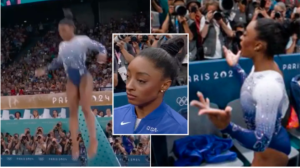
The American gymnast made a rare mistake on the beam as she missed out on Olympic gold.
Simone Biles appeared to complain about the crowd inside Paris’ Bercy Arena after she missed out on a medal in the gymnastics beam final.
The 27-year-old, who is widely regarded as the greatest gymnast of all time, was expected to claim another gold medal in Monday’s beam final.
So far, she has stormed to an unprecedented three gold medals in Paris and recently produced more brilliance in the individual women’s vault.
But days later, she made an uncharacteristic error after making a strong start to her routine. Biles proceeded to fall off the beam half way through, which prompted a number of gasps from the crowd.
The American regained her composure after the fall to complete the beam routine and earn a score of 13.100.
That being said, Biles was far from happy with the circumstances surrounding the fall. In fact, when she re-joined her coach and teammates at the seating area, she complained about the crowd inside Paris’ Bercy Arena.
Widespread reports suggest Biles accused them of making unnecessary noises as she took to the beam.
Throwing her hands in the air, it appears she told them to “stop shushing” before adding: “Why are they all shushing? As soon as I’m going they’re like shushing so much.”
USA teammate Sunisa Lee replied: “I don’t know why, are they [the Olympic gymnastics organisers] telling them to?”
It appears shouts of “come on Simone” were heard while she performed, which brought “shush” sounds from people in the audience. You can watch the events unfold below:
Craig Heap, the BBC commentator who was reporting on the event, said he’d “never seen Simone Biles look so angry” in his life.
“She was not happy. Something has gone on in the arena,” he said.
“Simone is not happy at all. It just goes to show she is a human being. All the other ladies in that final have made mistakes. She’s not invincible.’
Heap’s co-commentator Matt Baker clarified: “She’s talking about the atmosphere. She’s talking about shushing. The feeling in here is like a cauldron when the gymnasts are on. Oh my word.”
After losing her balance at the end of an aerial series, Biles placed fifth.
Italy’s Alice D’Amato deservedly won gold with a score 14.366, whilst China’s Zhou Yaqin took home a silver medal with 14.100. Manila Esposito of Italy picked up the bronze with 14.000.



